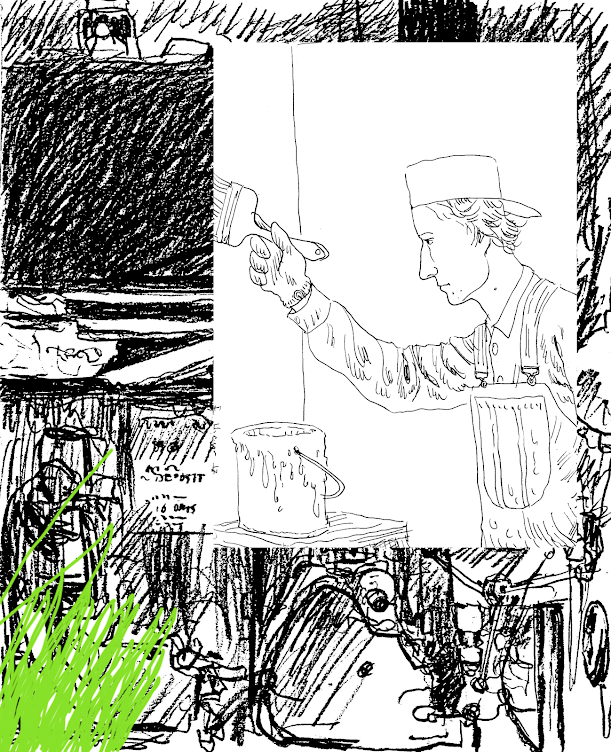Evan Munday of Quarter-Life Crisis and publicist for Coach House Press: |
1. Graphic fiction, we are told, is in; it has arrived. Academics talk about it, literary publishers include it -- sometimes -- on their lists. But how accepted is it really? Is it genuinely accepted by the high-brow, and viewed with true objectivity? Or is some of the praise that it is given merely bumpf? After all, MFA programs specialize in writing, not graphic fiction; English departments rarely if ever pay attention to graphic fiction; major publishers do not publish much of it, and major prizes never include it in short lists, even though it can be a form of novel. What needs to change for graphic fiction to gain more acceptance?
I'd say it has arrived, to a real degree. MFA program don't specialize in graphic fiction, true, but I think English departments are paying a lot of attention to graphic fiction. There are graphic novels on several English courses here at U of T. Not most of them, mind you, but I think their prevalence is growing in academia. I think MFA programs and major prized rarely focus on the genre because they don't know what to do with it. It's largely an illustrator-driven genre. Some of the best-known authors in comics (Art Spiegelman, Julie Doucette, Dan Clowes, etc) illustrate their work. And if they go to school for graphic fiction, it's to hone their illustration craft, rather than their writing. But I'm not sure that means graphic fiction hasn't arrived.
I feel that comics are a completely different medium. They come in book form, but I feel they land somewhere between books and movies.
One thing that hasn't happened, though, is the acceptance of all comics. Now, there's a very specific subset of comics that are considered 'worthy' (typically memoir or historical narratives), and the mass of what is published (superhero stuff, manga romance, crime tales) is treated largely as entertainment. There's not the same kind of critical attention given to the Stephen Kings or John Fords of the comics industry, the way there is in literature and film. Not sure if that analogy makes sense ... I hope so!
2. According to critic Alex Good, literary fiction is selling poorly these days and graphic novels are doing better. Is this as far as you know true?
I don't know, but I can say that graphic novels are the one real 'growth sector' of printed books. I wouldn't say literary fiction is not selling or selling poorly. (Hard for me to say, as that and poetry is largely what we sell at Coach House, and things seem to be going as well as they ever have here.) But sales of graphic novels are increasing year after year. So it's the one section of publishing that's doing better and better as time goes on.
3. Canada has produced a bounty of strong graphic fiction artists, including Julie Doucette, Chester Brown, Seth, etc. Any newer names you'd like to add to the list?
Yes. You may already know some of these, but I think Jeff Lemire is an oustanding comics guy. He did the Essex County Trilogy (a series of tales set in Ontario), and more recently has done work for Vertigo (The Nobody, Sweet Tooth).
And personally, I'm a fan of some of the more fun, unapologetically entertaining work, so I'm really into Bryan Lee O'Malley's video-game hipster romance Scott Pilgrim, Kate Beaton's historical web comics (Hark! A Vagrant!) and James Turner's justice-driven librarians (Rex Libris).
Also, he just has one book out so far, but I think Ethan Rilly is extremely talented. He just put out a short book called Pope Hats that I really like.
4. Can you tell us a little about marketing and distribution in the self-publishing world?
I haven't done a great deal. If I weren't working full-time, and if I could devote more of my self to my self-publishing endeavors, I'd have different answers. As it is, I don't have much in the way of time, and also, it's a strange line to tread. I do the same thing in my day job, so I'm hesitant to spend too much time publicizing my own book (when I'm employed by Coach House to publicize their/our books).
I printed the books at Coach House. I got estimates from Coach House Printing, worked out how many books I'd want printed, and what I had to sell those books at to make anything resembling profit.
In terms of distribution, I haven't done too much. I go around to local comic and bookstores and some take them on consignment. Others buy them up front. I've had a lot of luck at stores like The Beguiling, who have reordered several times. It helps that I know a lot of the booksellers (comic and otherwise) in Toronto. I also sell through my website (mail-order) and at a lot of events -- comic conventions, festivals, readings.
I haven't really done much in the way of marketing, mostly because it's a weird area for me, as it crosses over with what I do at Coach House. But I did send out some review copies, mostly to Toronto publication and websites and had a few reviews. Other than that, it's trying to get my face out at fairs and conventions, along with some other Toronto comic illustrators (we've formed a small collective called SketchKrieg!).


